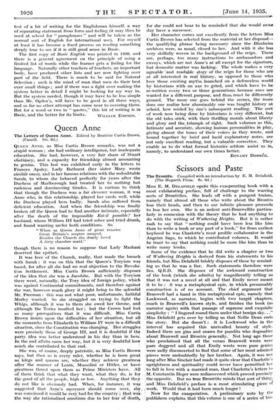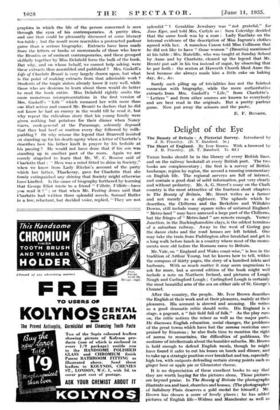Scissors and Paste
The Brontes. Compiled with an introduction by E. M. Delafield. (The Hogarth Press. 8s. 6d.) Miss E. M. DELAFEELD OpVITS this exasperating book with a most exhilarating preface, full of challenge to the warring sects of Bronteites. She leads off with a pungent truism, namely that almost all those who write about the Brontes lose their heads, and then to our infinite pleasure proceeds to lose her own. She is an ardent anti-Branwellite particu- larly in connexion with the theory that he had anything to do with the writing of Wuthering Heights. But it is rather rash to say that nothing could have been less like him than to write a book or any part of a book," for from earliest boyhood he was Charlotte's most prolific collaborator in the Angrian Saga, to which he contributed volumes. It would be truer to say that nothing could be more like him than to write many books:- Some of the evidence that he- did write a chapter or two of Wuthering Heights is derived from his statements to his friends, but Miss Delafield briskly disposes of these by remind- ing us that he was a liar. Such statements therefore were lies. Q.E.D. She disposes of the awkward construction of the- book (which she admits) by magnificently telling us that it was not a novel at all and that Emily never meant it to be : it was a metaphysical epic, in which presumably construction is of no account. The chief argument that Branwell had a hand in this metaphysical epic, namely that Lockwood, as narrator, begins with two turgid chapters, much in Branwell's known style, and finishes the book (as narrator again) with that passage of supreme and exquisite simplicity : " I lingered round them under that benign sky. .." Miss Delafield gets over by telling us that Nellie Dean ends the story. But she doesn't ; it is Lockwood who in the interval has acquired this unrivalled, beauty .of_ -style. Indeed there are gins and snares for pundits who dogmatize about Branwell and Brontës generally. " Not long ago those who proclaimed that all the verses Branwell wrote- were pure doggerel anti all that Emily wrote were pure genius were sadly,disconcerted to find that some of her most admired pieces were undoubtedly by her brother. Again, it was not long after Miss Sinclair had made it quite clear that Charlotte's uprightness and spirituality could never have permitted her to fall in love with a married man, that Charlotte's letters to M. Constantin Heger were rediscovered which proved precisely the opposite. But no true Bronteite minds that sort of thing., and:Miss Delafield's preface is-a -most stimulating piece of work. WoUld that it had been much longer 1-
Now for the exasperation. A preliminary note by the publishers explains that this volume is one of a series of bio-
graphics in which the life of the -person concerned is seen through the eyes of his contemporaries. A pretty idea, and one that could be pleasantly discussed at some literary tea-table ; but the result more resembles a protracted parlour game than a serious biography. Extracts have been made from the letters or books or memoranda of those who knew the Brontes or of eminent contemporaries, and these grouped skilfully together by Miss Delifield form the bulk of the book: But why, and on whose. behalf, we cannot help asking, were these extracts thus assembled and published ? Mrs. Gaskell's Life of Charlotte Bronte is very largely drawn upon, but what is the point of making extracts from that admirable work ? Students of the tragic sisters already know it very well, while those who are desirous to learn about them would do better to read the book entire. Miss Delafield rightly omits the more monstrous misrepresentations in the first version of Mrs. Gaskell's Life " which menaced her with more than one libel action and caused Mr. Brontë to declare that he did not know he had an enemy in the world till he read it, but why repeat the ridiculous story that his young family were given nothing but potatoes for their dinner when Nancy Garrs, cook-general at the Parsonage, solemnly deposed that they had beef or mutton every day followed by milk- pudding ? Or why reissue the legend that Branwell insisted on standing up for his death-agony when a letter of Charlotte's describes how his father knelt in prayer by his bedside at his passing ? He would not have done that if his son was standing up in another part of the room. Again we are merely stupefied to learn that Mr. W. C. Roscoe said of Charlotte that : Hers was a mind fitted to shine in Society,". when we know from Lady Ritchie's account of the party which her father, Thackeray, gave for Charlotte that she firmly extinguished any shining that Society might otherwise have kindled. Is the cause of biography furthered by learning that George Eliot wrote to a friend " Villette, Villette—have you read it ? " ; or that when Mr. Festing Jones said that Charlotte had written three splendid novels, Samuel Butler in a low, reluctant, but decided voice, replied, " They are not splendid " ? Geraldine Jewsbury was " not grateful," for Jane Eyre, and told Mrs. Carlyle so : Sara Coleridge decided that the same book was by a man : Lady Eastlake on the internal evidence of the description of Miss Ingram's clothes agreed with her. A nameless Canon told Miss Collinson that he did not like to have " those women " lBrontes) mentioned at his table : Mrs. Ratcliffe, who was taught at Sunday School by Anne and by Charlotte, cleared up the legend that Mr. Brontë put salt in his tea instead of sugar, by observing that he put both : the sexton at Haworth Church lilted Anne the best because she always made him a little cake on baking day, &c., &c.
Surely such piling up of trivialities has not the faintest connexion with biography, while the more authoritative extracts from Mrs. Gaskell's " Life," from Charlotte's " Letters " and from other sources are known to everybody and are best read in the originals. But a pretty parlour game. Now put away the scissors and the paste.
E. F. BENSON.



















































 Previous page
Previous page